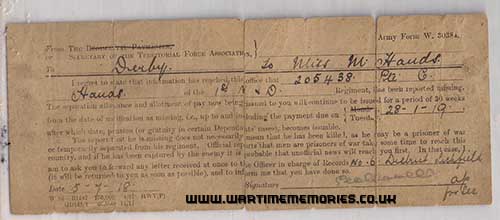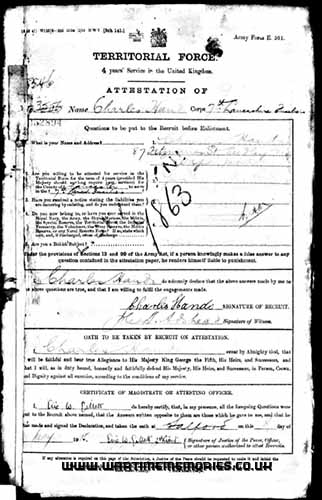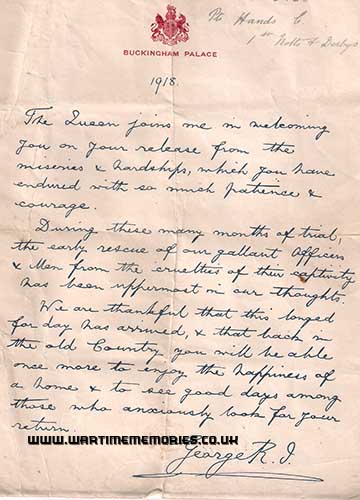|
|
|
Kassel POW Camp
If you can provide any additional information, please add it here.
|
|
Want to know more about Kassel POW Camp? There are:-1 items tagged Kassel POW Camp available in our Library There are:-1 items tagged Kassel POW Camp available in our Library 
These include information on officers, regimental histories, letters, diary entries, personal accounts and information about actions during the Great War.
|
|
Those known to have been held inKassel POW Camp during the Great War 1914-1918. - Hands Charles Eugene. Pte. Lancashire Fusiliers
All names on this list have been submitted by relatives, friends, neighbours and others who wish to remember them, if you have any names to add or any recollections or photos of those listed,
please.
Add a Name to this List
Records from Kassel POW Camp other sources.
|
|
The Wartime Memories Project is the original WW1 and WW2 commemoration website.

- 1st of September 2024 marks 25 years since the launch of the Wartime Memories Project. Thanks to everyone who has supported us over this time.
|
Want to find out more about your relative's service? Want to know what life was like during the Great War? Our
Library contains many many diary entries, personal letters and other documents, most transcribed into plain text.
|
Looking for help with Family History Research?
Please see Family History FAQ's
Please note: We are unable to provide individual research.
|
|
Can you help?
The free to access section of The Wartime Memories Project website is run by volunteers and funded by donations from our visitors.
If the information here has been helpful or you have enjoyed reaching the stories please conside making a donation, no matter how small, would be much appreciated, annually we need to raise enough funds to pay for our web hosting or this site will vanish from the web.
If you enjoy this site
please consider making a donation.
Announcements
- 19th Nov 2024
Please note we currently have a massive backlog of submitted material, our volunteers are working through this as quickly as possible and all names, stories and photos will be added to the site. If you have already submitted a story to the site and your UID reference number is higher than
264989 your submission is still in the queue, please do not resubmit.
Wanted: Digital copies of Group photographs, Scrapbooks, Autograph books, photo albums, newspaper clippings, letters, postcards and ephemera relating to the Great War. If you have any unwanted
photographs, documents or items from the First or Second World War, please do not destroy them. The Wartime Memories Project will give them a good home and ensure that they are used for educational purposes. Please get in touch for the postal address, do not sent them to our PO Box as packages are not accepted.
|
World War 1 One ww1 wwII greatwar great battalion regiment artillery
Did you know? We also have a section on World War Two. and a
Timecapsule to preserve stories from other conflicts for future generations.
|
|
|
1206608 Pte. Charles Eugene Hands 7th Btn. Lancashire Fusiliers  My father’s brother, Willie, had enlisted in the Army at the outbreak of the First World War in l914, when he was 18. Within a year he would be killed. (he is buried at Bailleul). It is significant that my father, Charles Hands, only once in his life ever mentioned to me his experiences in the war, possibly because, coming as he did from a loving, united and peaceful family, these must have had a devastating effect on him and were too painful to recall.
The minimum age for joining the armed forces was 18 so that when, at the Cross Lane, Salford Recruiting Agency, the Recruiting Officer learned that he was only 16 he told my father to walk once round his desk. “Now how old are you?â€, he asked. “19â€, replied my father. “Very good,†said the officer, “sign hereâ€. It was May 1915 and my father joined the 7th Lancashire Fusiliers. He was to remain in England, for at least some of the time on coastal duty in Scarborough, until March 1918 when he embarked for Ypres where his regiment was to meet up with another - the 8th Lancs. Fusiliers?..
Coming to a fork in the road, my father was sent one way, while a comrade was sent another, to find the Company in question. My father was successful in meeting up with the company and returned to his own with its commanding officer. To his horror he found that his own company had been attacked and wiped out. The scene that met his eyes must have been imprinted on his mind for the rest of his life: men and horses, dead or dying, were strewn everywhere along the road and in the ditches. The noise was hellish. I understood that none had survived.
Shortly after this, as they were trying to take a hill, the second company was surrounded by Germans. “Tommyâ€, they shouted, “drop your weapons, you are surroundedâ€. “I shall always be grateful to those Germansâ€, said my father, “they could have shot usâ€. As it was, they probably saved his life because he was transported to Kassel and put into a POW camp where he spent the next seven months, up to the end of the war. Army Form W. 3038A reporting my father missing was sent to his sister Madaleine on 5 July 1918.
It was in Kassel that my father lost his fussiness over food. Hunger was extreme both inside and outside the camp – the Germans were starving, too, and German children came to the wire fences to beg for food. There were occasional food parcels distributed by the international charities, also containing cigarettes and gloves and socks hand-knitted by wives, mothers and sisters back in England. The prisoners would swap and barter these precious offerings. My father was so hungry on one occasion that he offered to pay a comrade 25 shillings in War Bonds - to be delivered after the war - for eight biscuits! Twenty-five shillings was more than a working-man’s weekly wage in those days. “How do I know I’ll ever see the money?†the chap asked. “You have my promiseâ€, said my father. True to his word and much to his mother’s annoyance, my father sent the War bonds off to his comrade as soon as he got back home after the war. “After allâ€, he reasoned, “the chap trusted me and those eight biscuits at the time represented a banquetâ€.
  
|
Recomended Reading.Available at discounted prices.
|
|
|


Site Home
Great War Home
Search
Add Stories & Photos
Library
Help & FAQs
Allied Army
Day by Day
RFC & RAF
Prisoners of War
War at Sea
Training for War
The Battles
Those Who Served
Hospitals
Civilian Service
Women at War
The War Effort
Central Powers Army
Central Powers Navy
Imperial Air Service
Library
World War Two
Add Stories & Photos
Time Capsule
Help & FAQs
Glossary
Volunteering
News
Events
Contact us
Great War Books
About
There are:-1 items tagged Kassel POW Camp available in our Library
